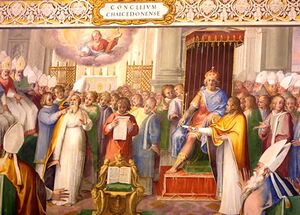Difference between revisions of "Fourth Lateran Council"
(Created page with "{{event |wikipedia=https://en.wikipedia.org/wiki/Fourth_Council_of_the_Lateran |start=1215 |end=1215 |constitutes= }} '''The Fourth Lateran Council''' In a series of lecture...") |
(some expand) |
||
| Line 3: | Line 3: | ||
|start=1215 | |start=1215 | ||
|end=1215 | |end=1215 | ||
| − | |constitutes= | + | |image=Fourth-Lateran.jpg |
| + | |interests=Catholic Church, | ||
| + | |constitutes=ecumenical council | ||
| + | |description=Catholic Church council in 1215 | ||
}} | }} | ||
| − | '''The Fourth Lateran Council''' | + | '''The Fourth Lateran Council''' was convoked by Pope [[Innocent III]] with the [[papal bull]] Vineam domini Sabaoth of 19 April [[1215]] and the Council gathered at Rome's [[Lateran Palace]] beginning 11 November [[1215]]. |
| − | In a series of lectures collected as ''Security, Territory, Population'' [[Michel Foucault]] "proposed that the Fourth Lateran Council’s requirement for annual confession was the beginning of a process of creating self-disciplining citizens who had internalized the values and ambitions of the [[state]], and who therefore did not need cruder forms of coercion to live by them." | + | Lateran IV stands as the high-water mark of the medieval papacy. Its political and ecclesiastical decisions endured down to the [[Council of Trent]] and beyond, while modern historiography has deemed it the most significant papal assembly of the Later Middle Ages.<ref>[http://lateraniv.com/ Concilium Lateranense IV]</ref> The Fourth Lateran Council was the largest and most representative of the medieval councils to that date.<ref name=Duggan>http://faculty.cua.edu/Pennington/Canon%20Law/DugganACouncils.htm</ref> |
| + | |||
| + | ==Self-disciplining citizens== | ||
| + | In a series of lectures collected as ''Security, Territory, Population'' [[Michel Foucault]] "proposed that the Fourth Lateran Council’s requirement for annual confession was the beginning of a process of creating self-disciplining citizens who had internalized the values and ambitions of the [[state]], and who therefore did not need cruder forms of coercion to live by them."{{CN}} | ||
{{SMWDocs}} | {{SMWDocs}} | ||
==References== | ==References== | ||
{{reflist}} | {{reflist}} | ||
| − | |||
Latest revision as of 05:43, 15 June 2021
 | |
| Date | 1215 |
|---|---|
| Interests | • Catholic Church |
| Description | Catholic Church council in 1215 |
The Fourth Lateran Council was convoked by Pope Innocent III with the papal bull Vineam domini Sabaoth of 19 April 1215 and the Council gathered at Rome's Lateran Palace beginning 11 November 1215.
Lateran IV stands as the high-water mark of the medieval papacy. Its political and ecclesiastical decisions endured down to the Council of Trent and beyond, while modern historiography has deemed it the most significant papal assembly of the Later Middle Ages.[1] The Fourth Lateran Council was the largest and most representative of the medieval councils to that date.[2]
Self-disciplining citizens
In a series of lectures collected as Security, Territory, Population Michel Foucault "proposed that the Fourth Lateran Council’s requirement for annual confession was the beginning of a process of creating self-disciplining citizens who had internalized the values and ambitions of the state, and who therefore did not need cruder forms of coercion to live by them." [Citation Needed]